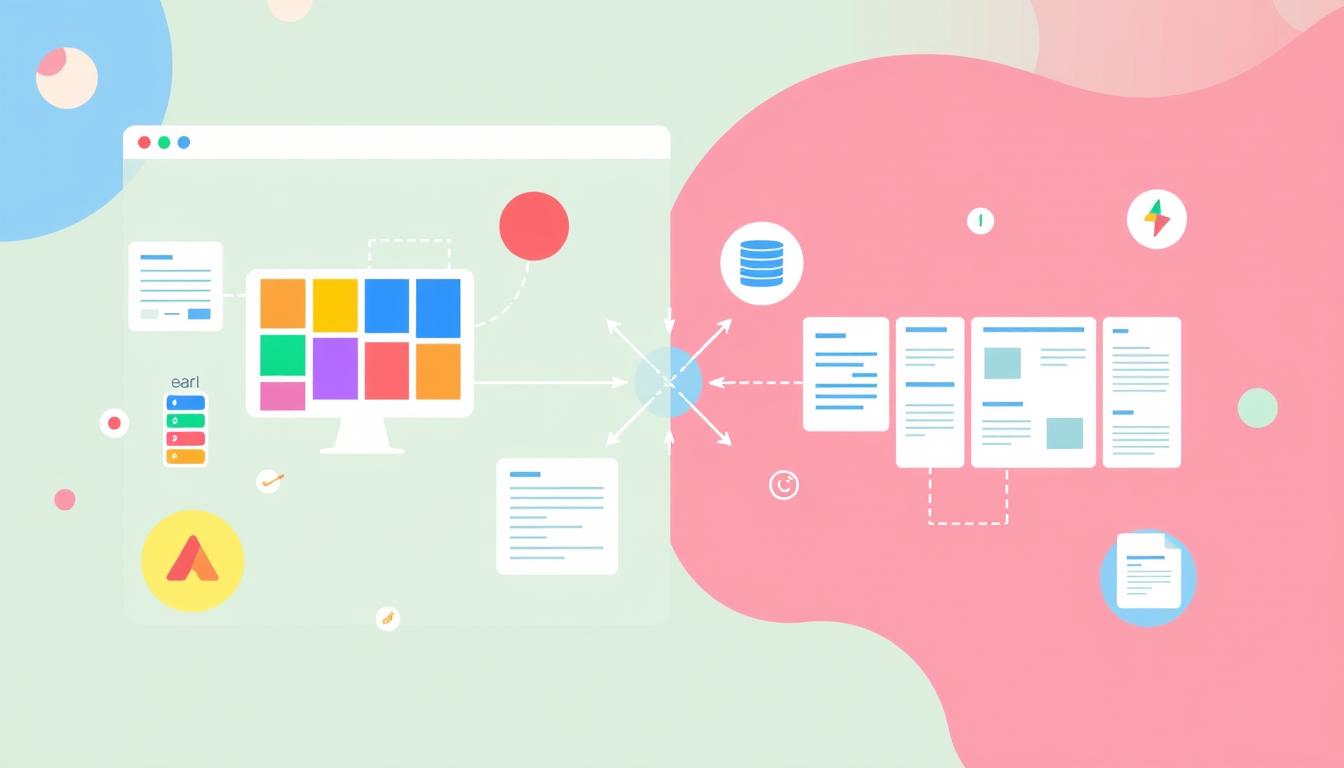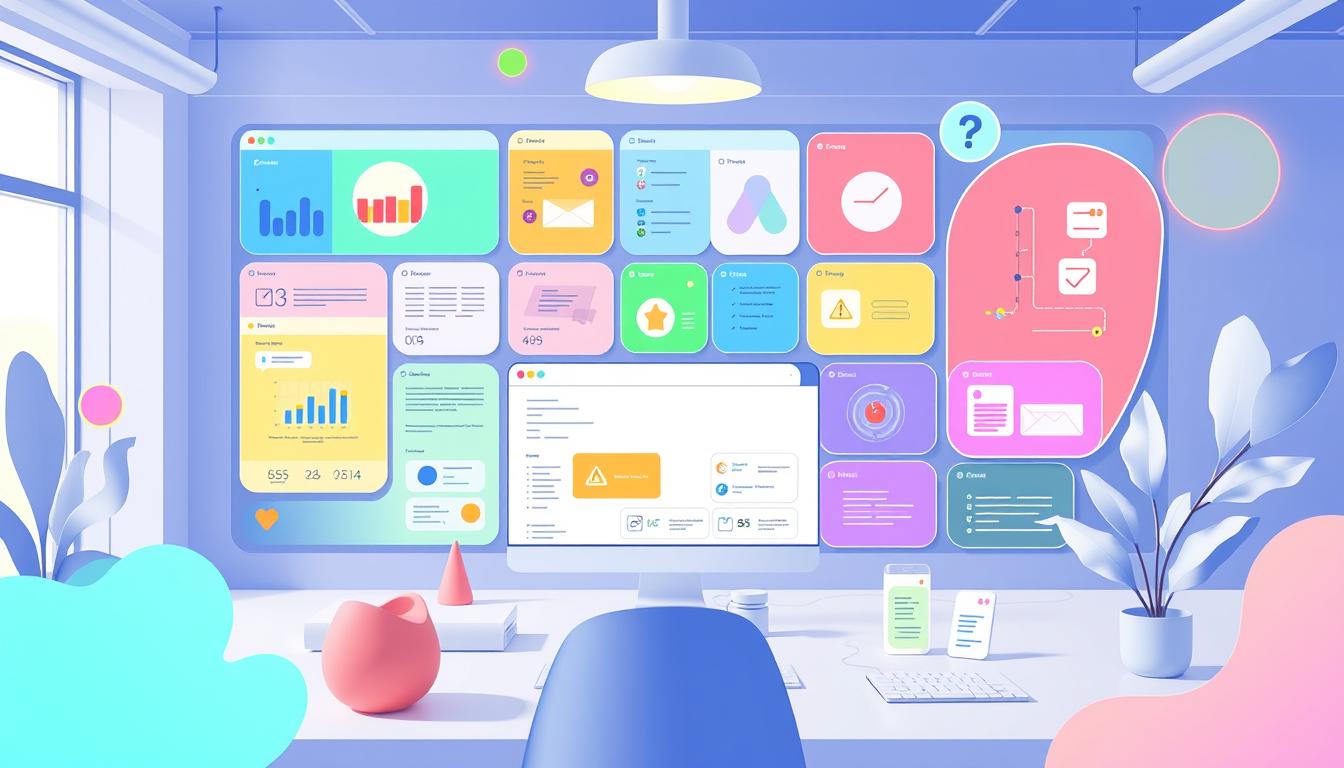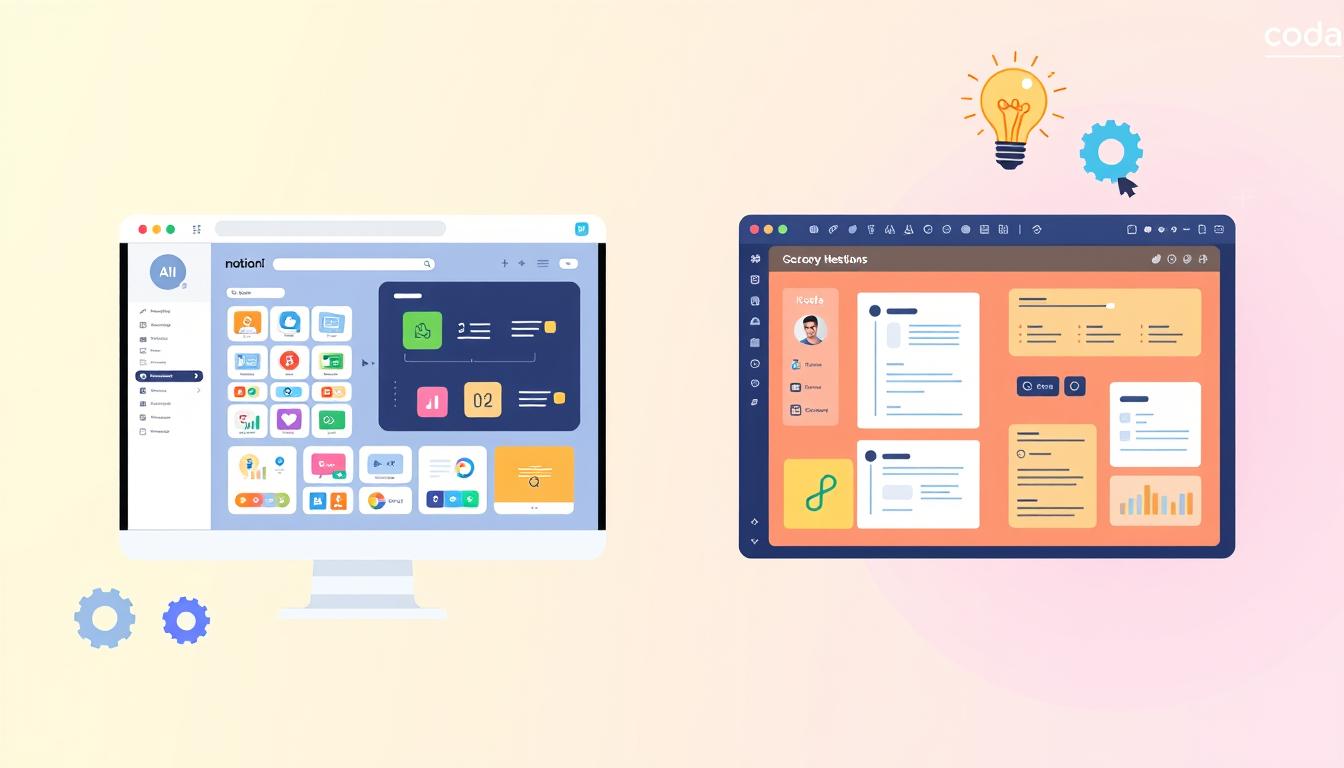Last Updated on December 9, 2025
Choosing the right productivity tools is crucial for team efficiency. In the project management space, Airtable vs Notion is a key debate. Both tools are popular for their ability to manage tasks, plan projects, and reach goals. It’s important to understand their strengths and weaknesses to make an informed choice that meets your needs.
Key Takeaways
- Airtable offers a starting price of $20 per user per month, while Notion begins at $10 per user per month.
- Both tools provide free versions, accommodating unlimited bases and pages.
- Airtable has a higher rating of 4.2 out of 5, whereas Notion rates at 4.4 out of 5.
- Notion excels in knowledge management, while Airtable is suited for data management.
- Airtable’s features include invoicing, budgeting, and advanced database capabilities.
- Notion supports over 20 integrations compared to Airtable’s 7 built-in integrations.
- Airtable provides multiple views like Gantt charts and timelines, offering flexibility in project layouts.
Introduction to Productivity Tools
In today’s fast-paced work environment, productivity tools are essential for boosting team efficiency and streamlining operations. They make collaboration and communication among team members better. This ensures projects are planned well and executed smoothly. The right tools can significantly change how your team works, from managing tasks to planning projects.
It’s important to understand the various functionalities of these tools when choosing software. Consider factors like ease of use, integration capabilities, and collaboration features. These aspects can greatly influence your decision. Here’s what to look at when evaluating productivity tools:
- Usability: Opt for tools that your team can easily adopt. Complex interfaces can slow progress and lower team efficiency.
- Integration: Seek software that integrates well with other applications your team uses. This can improve work management and streamline processes.
- Collaboration: Good productivity tools should have features for task delegation and real-time discussions. They foster a cooperative work environment.
As you explore productivity tools, focus on how each can enhance your team’s performance and project outcomes.
What is Airtable?
Airtable combines the ease of spreadsheets with the robustness of databases, offering a versatile solution for teams. It’s perfect for managing data, allowing you to organize structured information efficiently. Its user-friendly interface makes it accessible to all.
Airtable Overview
Airtable stands out for its flexibility, enabling users to create customized tables and integrate various data types. It’s ideal for managing projects, from inventory to production schedules. Its design caters to both beginners and experts, fostering a collaborative environment.
Key Features of Airtable
Airtable boasts a range of tools that enhance its capabilities:
- Customizable Views: Switch between grid, calendar, Kanban, and gallery styles to visualize your data effectively.
- Linked Records: Create connections between different tables for a more comprehensive data management experience.
- Collaboration Tools: Delegate tasks, comment on entries, and share views seamlessly with your team.
- Automations and Integrations: Airtable integrates with over 1,000 apps, empowering you to automate workflows and streamline processes.
What is Notion?
Notion is a versatile all-in-one workspace, ideal for teams needing a balance between documentation and creativity. It caters to a wide range of needs, from managing projects to organizing knowledge. Notion’s flexibility lets you organize information in a way that fits your workflow perfectly.
Notion Overview
The Notion overview showcases a powerful documentation tool that merges different content types into one framework. Users can craft notes, task lists, and databases, all tailored to their specific needs. Its modular design supports seamless collaboration, allowing for the creation of wikis and the efficient organization of documents.
Key Features of Notion
Notion offers a range of functionalities that boost productivity and team collaboration. Key features include:
- Block-based structure: This enables diverse content layouts using various block types such as text, images, and buttons.
- Powerful database capabilities: Manage and organize data effectively while maintaining flexibility.
- Pre-built templates: Access numerous templates designed for quick implementation, catering to various projects and workflows.
- Customizable workspaces: Adapt the workspace to your team’s specific needs, promoting better knowledge management.
In essence, Notion is a dynamic solution for users looking for a comprehensive documentation tool. It enhances knowledge management and fosters collaboration within teams.
Airtable vs Notion: Key Differences
Airtable and Notion stand out in the productivity software arena, each with unique strengths. Identifying the Airtable vs Notion differences is crucial for selecting the ideal tool. Airtable excels in project management, customer relationship management, and content creation. On the other hand, Notion is renowned for personal productivity, team collaboration, and knowledge management.
In a feature comparison, Airtable offers customizable databases with advanced filtering, sorting, and grouping. This makes it perfect for teams needing to collaborate on databases in real-time. Notion, with its modular design, supports a variety of content types like to-do lists, databases, and embedded elements. It fosters an organized workspace.
The user experience differs significantly between the two platforms. Notion boasts a simple interface, similar to a text editor, making it accessible to more users. Airtable, with its spreadsheet-like interface, might be overwhelming for those new to databases.
Both tools provide templates for starting projects and have seamless sharing options for team collaboration. They also integrate with popular third-party apps to enhance workflow efficiency. Airtable connects with Slack and Google Drive, while Notion integrates with Trello and supports various integrations to expand its capabilities.

Airtable’s complexity might deter some users, whereas Notion’s simplicity appeals to a broader audience. Notion’s AI capabilities, including text generation and summarization, are particularly attractive. However, Airtable is also developing its AI features, making it a strong contender.
Choosing between Airtable and Notion depends on your specific needs. Airtable is ideal for database sharing and app creation, while Notion excels in document creation and knowledge management. Understanding these differences helps you make an informed decision for your team’s collaboration style.
Which Tool is Best for Data Management?
Organizations face the challenge of managing data effectively. The choice of tools is critical. Airtable and Notion offer unique strengths in handling structured data. They support diverse data management needs. Understanding their functionalities can greatly enhance productivity and organization efficiency.
Airtable’s Strengths in Data Management
Airtable is a top choice for data management tools. It offers database-like features. This platform allows you to:
- Input and manage various data types with ease.
- Link records across tables, providing powerful relational capabilities.
- Utilize multiple views for data representation, including grid, calendar, and Kanban views.
- Create unlimited databases across all plans, accommodating extensive data handling requirements.
Airtable’s automation features assist teams in triggering actions with various apps. This enhances workflow efficiency. It excels in integrations with platforms like Salesforce and Google Workspace. It allows seamless data importing from over 25 sources.
Notion’s Approach to Data Management
Notion combines document creation with basic data management functionalities. Its strengths lie in:
- Integrating documents with structured data, making it ideal for knowledge management.
- Providing extensive templates and customization options that cater to various use cases.
- Allowing unlimited blocks on paid plans, giving flexibility in content creation.
While Notion supports basic databases, it may not compete with Airtable’s advanced database features. It excels in text-heavy tasks, such as managing company knowledge bases or onboarding documents. This offers great value in collaborative environments.
Choosing between Airtable and Notion depends on your specific data management needs. Each tool provides distinct features tailored for various tasks. Explore this resource to discover more insights about productivity tools that can suit your organizational goals.
How Do Pricing Plans Compare?
Understanding the pricing of Airtable and Notion is key to making an informed choice. Both tools have plans tailored to different budgets and needs. A direct comparison is essential.
Airtable’s Pricing Structure
Airtable offers several pricing tiers, starting with a Free plan for exploring features. The Plus plan costs $10 per seat per month annually. The Pro plan raises the price to $20 per seat monthly. These plans help teams manage projects and collaborate affordably.
Notion’s Pricing Structure
Notion also has a Free plan, mainly for individuals. The Plus plan for teams is $8 per user monthly, with the Business plan at $15. Notion’s plans are more affordable, appealing to smaller teams for effective project management.
Both Airtable and Notion are highly rated by users. Notion scores 4.6/5 on G2 and 4.7/5 on Capterra from over a thousand reviews. This feedback highlights the value of both tools for various workflows, despite their different pricing.
Collaboration Features Compared
Effective team collaboration is crucial for any project’s success. Airtable and Notion offer unique capabilities to enhance teamwork. By examining Airtable tools and Notion tools, we see how they streamline communication and project management.
Airtable’s Collaboration Tools
Airtable supports collaboration with a wide range of features. Users can enjoy:
- Commenting: Team members can leave feedback directly on projects, ensuring all input is centralized.
- Task Assignment: Assigning tasks to individuals guarantees clarity in responsibilities and deadlines.
- Real-Time Updates: Changes are reflected instantly, allowing everyone to stay on the same page.
- Visual Scheduling: Tools like Kanban and Gantt views promote organized project tracking and communication.
These Airtable tools cater to various team needs, whether for simple task tracking or complex project management.
Notion’s Collaboration Tools
Notion also excels in enabling productive team collaboration. Its features include:
- Real-Time Editing: Multiple users can edit documents simultaneously, making teamwork seamless.
- Document Sharing: Users can share content via links, ensuring easy access to relevant materials.
- User Mentions: Notifying individuals within team spaces helps in directing attention where needed.
- Customization: The extensive layout options allow teams to tailor their environment according to specific project requirements.
These collaboration features enhance user experience and foster a conducive team environment. They empower members to work efficiently.

Pros and Cons of Each Tool
When evaluating productivity tools like Airtable and Notion, it’s crucial to weigh their strengths and weaknesses. Each platform excels in different areas, catering to various needs. Understanding these aspects can guide you in selecting the most suitable tool for your workflow.
Pros of Airtable
Airtable boasts several compelling benefits:
- Powerful data management: Its features support extensive databases and project tracking, making it ideal for data-driven teams.
- Ease of integration: Seamless connections with other applications enhance productivity across various tasks.
- Robust collaboration tools: Real-time collaboration allows teams to work together efficiently.
Cons of Airtable
Despite its strengths, Airtable has some disadvantages:
- Steeper learning curve: New users may find it more challenging to navigate compared to Notion.
- Limited mobile usability: Its interface is less optimized for mobile devices.
- Project management limitations: While versatile, Airtable lacks some advanced project management features.
Pros of Notion
Notion offers numerous advantages that attract users:
- High customization: Users can mold their workspace tailored to individual or team needs.
- Affordable pricing: Notion offers a budget-friendly subscription model, making it accessible for small teams and projects.
- Diverse templates: A wide range of templates simplifies setup for various tasks and projects.
Cons of Notion
However, Notion has some drawbacks to consider:
- Lacks advanced tracking features: It does not offer time tracking or invoicing tools.
- Limited project management capabilities: Custom reporting and automation features are absent.
- Less focus on data management: Notion is more suited for flexible note-taking than structured data analysis.
Use Cases for Each Tool
Organizations often face a decision between Airtable and Notion, based on their specific needs and operational complexities. Each tool offers unique advantages, tailored to various workflows and team scenarios. Understanding Airtable and Notion use cases provides valuable insight into how these platforms serve different objectives.
Airtable Use Cases
Airtable excels in environments where structured data handling is crucial. Its real-world applications include:
- Project Management: Teams can utilize Airtable to track tasks, deadlines, and resource allocation effectively.
- CRM Systems: The structured design supports customer relationship management, making it easier to track interactions and sales.
- Content Scheduling: Content teams benefit from customizable views such as calendars and Kanban boards to organize their editorial calendar.
Notion Use Cases
Notion excels in scenarios where documentation and organization are crucial. The platform’s real-world applications include:
- Wikis: Companies use Notion to create comprehensive knowledge bases that are easily navigable.
- Personal Organization: Users manage tasks, notes, and reminders all in one place, helping them stay on top of personal projects.
- Content Management: With its ability to integrate text and media, Notion is well-suited for writing and content development.

User Community and Support
Community support is key when using productivity tools like Airtable and Notion. Both platforms boast vibrant user communities. These communities offer valuable resources and forums for knowledge sharing and assistance.
Airtable’s Community and Resources
The Airtable community is lively, filled with activity in forums and user groups. It’s packed with resources to help you learn quickly. The community shares tips, tricks, and discusses integrations and creative uses of the platform.
This support is crucial for getting the most out of Airtable. It helps you streamline your workflow and boost productivity.
Notion’s Community and Resources
The Notion community, known as “Notioneers,” is all about collaboration and creativity. It’s a place where users share extensive resources like templates, tutorials, and community meetups. These shared resources showcase innovative ways to use the platform.
Having such support makes it easier to find solutions that fit your unique workflows. It’s a valuable asset for anyone looking to maximize their productivity with Notion.
Conclusion
When evaluating Airtable vs Notion, the decision hinges on your team’s specific needs and goals. Each platform offers unique strengths and weaknesses tailored to various workflows. Airtable excels in data management, boasting a structured interface and robust permission controls. This makes it perfect for teams that need precise data tracking.
Notion, on the other hand, stands out for its versatility. It comes with a vast template library and seamless integration with external tools. This makes it ideal for collaborative document creation.
In selecting a tool, focus on the functionalities that are most critical to your team. If your work demands organization and detailed data analysis, Airtable might be the better choice. However, if you prioritize documentation and cross-functionality, Notion could be the way to go. Consider pricing, user community, and the unique capabilities of each platform as you make your decision.
Both Airtable and Notion offer free plans, allowing you to test their features before committing. This is a great chance to find the tool that best fits your objectives. Remember, your choice can greatly impact your team’s productivity and collaboration. So, choose carefully.








